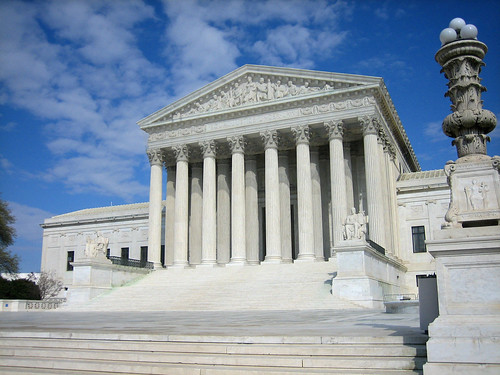
Supreme Court Upholds "Preclearance" Provision in 1965 Voting Rights Act
6/30/2009

The U.S. Supreme Court upheld the "preclearance" provision in Northwest Austin Municipal Utility District No. 1 (NAMUDNO) v. Holder, a case in which a small utility district in Texas challenged Section 5 of the Voting Rights Act of 1965. Section 5, reauthorized by Congress in 2006, applies to all or parts of 16 states. It requires those states to get federal approval before changing election rules or procedures, due to past laws and practices that discriminated against and disenfranchised racial minorities. This provision is referred to as the "preclearance" provision.
The Court concluded that NAMUDNO had the ability to seek a statutory exemption from the preclearance requirements of Section 5 of the Voting Rights Act. The Court's decision preserved all aspects of Section 5, but it overruled a lower court decision that NAMUDNO was ineligible for the exemption. The preclearance requirement has been one of the most successful provisions of the Voting Rights Act, deterring and preventing many voting changes that would have harmed minority electoral participation and representation.
The utility district wanted a bailout, but Section 5 says that only a state or political subdivision that registers voters can petition for a bailout. The utility district does not register voters, so the statutory language indicates that it cannot seek an exemption, or "bail out," of the provision.
The decision to allow the utility district to petition for an exemption allowed the Court to uphold Section 5 while avoiding constitutional questions surrounding Congress’s reauthorization of the provision. Instead of directly addressing whether it was constitutional for Congress to reauthorize the provision, the Court, by an 8-1 majority, agreed that the utility district in Texas was entitled to petition for an exemption. The decision came as a relief to civil rights groups and can be seen as a temporary victory for proponents of Section 5, particularly after oral arguments seemed to indicate that Section 5 could be struck down.
"The Court avoided the constitutional question whether Section 5 exceeds congressional power because there's not enough evidence of intentional discrimination by these covered jurisdictions through a holding that the utility district is entitled to ask for bailout," according to Rick Hasen, a Loyola law professor and moderator of the Election Law Listserv.
Justice Clarence Thomas was the only justice to dissent, but his dissent, which was based on constitutional grounds, still may be a precursor to how the Court ultimately decides the constitutionality of Section 5. "The violence, intimidation and subterfuge that led Congress to pass Section 5 and this court to uphold it no longer remains," Thomas claimed.
Thomas’ words, which suggest that Section 5 is not needed in today’s political climate, serve as an indication that in future cases, the Court may narrow or even overturn a pivotal finding in City of Boerne v. Flores, a 1997 case concerning the scope of Congress's enforcement power under the fifth section of the Fourteenth Amendment. The current decision by the Court not to consider the key constitutional issue may also serve as notice to Congress to produce evidence that covered jurisdictions still engage in discriminatory acts or would do so if they were not covered by Section 5. Chief Justice Roberts wrote in the majority opinion, "The statute's coverage formula is based on data that is now more than 35 years old, and there is considerable evidence that it fails to account for current political conditions."
Civil rights groups, however, believe that Section 5 is still important. "Without [Section 5’s] protections, our nation would unnecessarily face the grave risk of significant backsliding and retrenchment in the fragile gains that have been made," said John Payton, Director-Counsel for the NAACP Legal Defense Fund, one of the groups that argued before the Court to keep Section 5’s provisions intact.
The outcome of this case is important to nonprofits because it affects constituents often served by nonprofit organizations. Nonprofits have been instrumental in helping to ensure that voters are not disenfranchised and that underrepresented groups are adequately counted in the Census. Supporters of the law have noted that by avoiding the constitutional issue, the Court ensured that Section 5’s "provisions probably will be in place to guide the electoral redistricting plans required by the 2010 census," according to the Washington Post.
Image in teaser by flickr user laura padgett, used under a Creative Commons license


